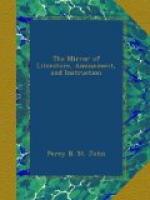The latter,—
——“resign the way, To shun the surly butcher’s greasy tray: Butchers, whose hands are died with blood’s foul stain, And always foremost in the hangman’s train.”
The butchers’ company was not incorporated until the 3rd year of King James I. when they were made a Corporation, by the name of master, wardens and commonalty of the art and mystery of butchers; yet the fraternity is ancient.
Stowe says, “In the 3rd of Richard II. motion was made that no butcher should kill any flesh within London, but at Knightsbridge, or such like distant place from the walls of the citie.”
P.T.W.
* * * * *
STUMBLING AT THE THRESHOLD.
The phrase, “to stumble at the threshold,” originated in the circumstance, that the old thresholds, or steps under the door, were like the hearths, raised a little, so that a person might stumble over them, unless proper care were taken. A very whimsical reason for this practice is given in a curious little tract by Sir Balthazar Gerbier, entitled, “Council and Advice to all Builders,” 1663, in these words:—“A good surveyor shuns also the ordering of doores with stumbling thresholds, though our forefathers affected them, perchance to perpetuate the antient custome of bridegroomes, when formerly at their return from church they did use to lift up their bride, and to knock her head against that of the doore, for a remembrance that she was not to pass the threshold of her house without leave.”
W.G.C.
* * * * *
CHINESE PHYSICIANS.
The charitable dispensation of medicines by the Chinese, is well deserving notice. They have a stone which is ten cubits high, erected in the public squares of their cities; whereon is engraved the name of all sorts of medicines, with the price of each, and when the poor stand in need of relief from physic, they go to the treasury to receive the price each medicine is rated at.
The physicians of China have only to feel the arm of their patient in three places, and to observe the rate of the pulse, to form an opinion on the cause, nature, danger, and duration of the malady. Without the patient speaking at all, they can tell infallibly what part is attacked with disease, whether the brain, the heart, the liver, the lungs, the intestines, the stomach, the flesh, the bones, and so on. As they are both physicians and apothecaries, and prepare their own medicines, they are paid only when they effect a cure. If the same rule were introduced with us, I fear we should have fewer physicians.
* * * * *
THE TOPOGRAPHER
BOX HILL.
(For the Mirror.)




